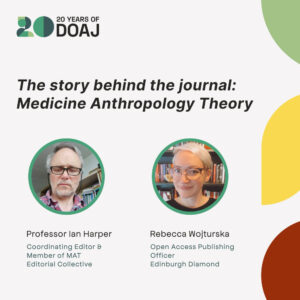by Rebecca Wojturska, Open Access Publishing Officer, The University of Edinburgh
On Tuesday 27th June, the OASPA (Open Access Scholarly Publishing Association) and DOAJ (Directory of Open Access Journals) announced the release of a new Open Access Journals Toolkit. I was fortunate enough to be asked to join the editorial board in my capacity as Open Access Publishing Officer within Edinburgh University Library, and would love to share my experience of helping to write the guide!
The aim of the toolkit was to “promote transparency, accessibility, and inclusivity in scholarly publishing.” As these values align with Edinburgh Diamond (the library’s journal and book hosting service), I very quickly said yes at the opportunity to get involved.
Firstly, I was very pleased to see the board was extensive and included a range of subject experts in Open Access and journal publishing. Having so many board members helped split the workload and meant there were many eyes on each section. The fact that board members are from all around the world ensured that the toolkit wasn’t just from a Global North point of view, and would be useful for anyone, no matter where they are based. It was also great to meet so many of my peers!
The journal toolkit has many topics and provides an overview of the subject, as well as references and further reading for more detailed information. Each board member was each assigned three topics to lead, involving conducting research in this area and writing a section containing everything a reader might need to know about the topic. We were under instruction not to bulk it out too much as the guide was meant to be easy to digest and not too overwhelming for a beginner. The sections then went into peer review, where another board member would look over your contributions and provide as much feedback as they could, giving you scope to revise and strengthen them. Then, a third member would give it a final look-over to catch any last minute errors or omissions. Finally, Research Consulting, who were the consultants pulling it all together, tidied up everything and ensured the toolkit read consistently throughout. Overall, the toolkit was really well-crafted and extensively peer-reviewed.
Library publishing is a growing area, and most if not all of the services and presses within libraries focus on Open Access. However, there isn’t as much guidance or resources available that are tailored specifically to Open Access, especially for under-resourced journals and initiatives, who are the core target users for the toolkit. This is extra important when you consider most teams in this area are new to it and consist of a very small amount of staff. Knowing how to even get started is incredibly daunting, and the toolkit means all those starting steps are laid out for users to follow, making the process more manageable and smooth. Also, having an easy-to-access toolkit means that everyone with an internet connection can find out all the basics they need to consider, and at no cost to them. Even better, most of the content in the toolkit is openly licensed under a Creative Commons Attribution 4.0 International License!
Our Edinburgh Diamond service will be using the toolkit for when we have a new editor looking to launch a journal or flip to Open Access. I’ll also be recommending it to our shared service partners, many of whom run their own Open Access initiatives, as the toolkit is a great way to ensure journals hit the ground running, are of a high standard, and are an attractive option for authors. For us, it helps strengthen the reputation and prestige of our service, helping cement the sustainability and viability of Diamond Open Access in the library.
The toolkit has a very sleek and user-friendly interface, so why not check it out and find out how it could be useful for you too?
The Open Access Journals Toolkit


